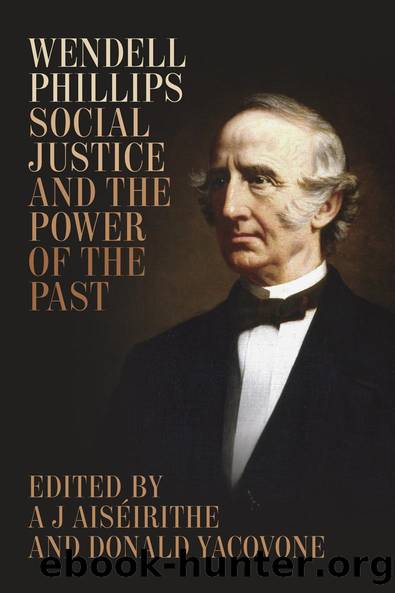Wendell Phillips, Social Justice, and the Power of the Past by A J Aiséirithe Donald Yacovone

Author:A J Aiséirithe, Donald Yacovone [A J Aiséirithe, Donald Yacovone]
Language: eng
Format: epub
ISBN: 9780807164051
Barnesnoble:
Publisher: Louisiana State University Press
Published: 2016-11-01T00:00:00+00:00
8
THE PEOPLE COMING TO POWER!
Wendell Phillips, Benjamin F. Butler, and the Politics of Labor Reform
MILLINGTON W. BERGESON-LOCKWOOD
Wendell Phillips had been dead six years, buried alongside his wife, Ann, in Milton, Massachusetts, before aging former Civil War general and Massachusetts governor Benjamin F. Butler took the stage in December 1890. At Bostonâs Tremont Temple he shared recollections of his work with the famous orator, antislavery leader, and social reformer. Butler recalled his long relationship with the renowned activist and paid special attention to their association during the final decade of Phillipsâs life. Clear in Butlerâs words was the central thread connecting Phillipsâs lifetime of advocacy. âHe became a champion of labor,â Butler told the packed audience. âHe classed black and white labor together. In that he and I stood together.â1 From Phillipsâs fight against slavery through his battle for just labor policy and against moneyed interests in politics, causes that occupied him until the end of his life, he stood with common people against forces that would rob them of their economic autonomy and political voice. In the last decade of his life, Butler became one of his most constant allies and a recipient of Phillipsâs support.
Butlerâs presence on the dais in 1890, however, did more than merely provide a thoughtful recollection of the life of a great man. Rather, Butler and his political career served as the living embodiment of Phillipsâs postwar political philosophy, which condemned major parties and moneyed control in politics. Phillips imbued Butlerâs campaigns for public office with rich meaning and viewed the general as the best hope for challenging the political status quo.
Exploring Phillipsâs support of Butler in his campaigns for Massachusetts governor exhibits how much Phillipsâs ideology of social democracy drove his politics, and departed from his rejection of electoral political action during his antebellum years. Further, it shows how his calls for labor and finance reform in the last decade of his life went beyond bettering the condition of working people and became part of a broader political strategy. In Phillipsâs view, Butler was the politician most likely to lead a movement toward a new political order where common people, black and white, and not the wealthy elite drove the political system.
Phillipsâs vision of electoral politics reflected how he viewed the relationship between labor and capital in the American economic system. Just as workers should have full control and benefit of their labor, voters should be able to shape society without interference from party machines or moneyed corruption. In labor, selfish business owners who privileged profit above all else oppressed the worker. In politics, party bosses and the influence of money compromised the power of the popular vote. Phillips advocated a labor system wherein capital and labor worked as partners. The voice of labor should have a decisive role in determining business decisions, and profits from workersâ efforts should be spent on comfortable wages first before going into the owner or shareholdersâ coffers. Likewise, in politics, the rights and voice of the everyday voter
Download
This site does not store any files on its server. We only index and link to content provided by other sites. Please contact the content providers to delete copyright contents if any and email us, we'll remove relevant links or contents immediately.
| United States | Abolition |
| Campaigns & Battlefields | Confederacy |
| Naval Operations | Regimental Histories |
| Women |
In Cold Blood by Truman Capote(3378)
The Innovators: How a Group of Hackers, Geniuses, and Geeks Created the Digital Revolution by Walter Isaacson(3165)
Steve Jobs by Walter Isaacson(2889)
All the President's Men by Carl Bernstein & Bob Woodward(2370)
Lonely Planet New York City by Lonely Planet(2218)
And the Band Played On by Randy Shilts(2199)
The Room Where It Happened by John Bolton;(2152)
The Poisoner's Handbook by Deborah Blum(2135)
The Innovators by Walter Isaacson(2098)
The Murder of Marilyn Monroe by Jay Margolis(2095)
Lincoln by David Herbert Donald(1983)
A Colony in a Nation by Chris Hayes(1927)
Being George Washington by Beck Glenn(1925)
Under the Banner of Heaven: A Story of Violent Faith by Jon Krakauer(1795)
Amelia Earhart by Doris L. Rich(1691)
The Unsettlers by Mark Sundeen(1682)
Dirt by Bill Buford(1671)
Birdmen by Lawrence Goldstone(1662)
Zeitoun by Dave Eggers(1644)
